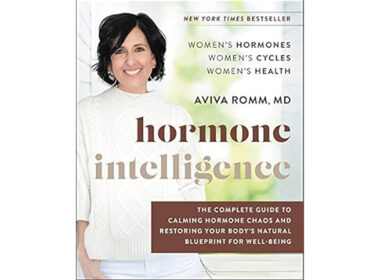I finally caught COVID in January this year. I say “finally” because by then the Omicron variant was spreading like wildfire through the United States, and I was starting to feel like the last woman standing.
Fortunately, I didn’t get that sick, and it was over in less than a week—at least, my symptoms were. The impact on my cycle happened a little later, with delayed ovulation and, therefore, a later-than-expected-period. Fortunately, I chart my cycle using a fertility awareness method (FAM), so I knew to expect a late period when I saw a late peak day (the term used for a charting woman’s best guess of the day of ovulation).
Being able to predict a late period is a great benefit of charting your cycle—but why does illness sometimes affect it in the first place? Cycle changes caused by sickness have to do both with how your body responds to the stress of being sick and where you’re at in your cycle when you get sick. COVID infection, like other types of illness, can also cause cycle changes.
How illness impacts hormones
Most of us have experienced firsthand the impact stress can have on our body, whether it’s insomnia, lack of an appetite, or just feeling run-down or tired. But stress can also have an impact on our hormones [1]. For instance, stress occurring before ovulation can make the brain think that now is not a good time to get pregnant, which can then delay the release of the hormones that cause ovulation—and with late ovulation comes a late period. Ongoing stress can even keep ovulation from happening at all. If stress occurs after ovulation, it can cause a shorter luteal phase and an early period. Again, the body’s response to the stressor is to try to prevent pregnancy, in this case by shortening the luteal phase to prevent successful implantation of a newly conceived zygote.
Illness can cause cycle changes because it’s a form of stress on the body. But that’s not all. The hormones that coordinate the menstrual cycle also directly interact with the immune system. As the authors of one study state, “The menstrual cycle is regulated by a complex interplay of hormones that interact with the immune, vascular and coagulation systems, and these interactions can influence menstrual bleeding and severity of (pre)menstrual symptoms” [2]. For instance, they write, in the face of severe illness, your body can temporarily divert energy from the reproductive system to the immune system.
Notably, one recent study looking at data from 43,999 recorded menstrual cycles from 1985 to 2016 suggests that minor illnesses such as a cold do not have an impact on a woman’s ability to get pregnant [3]. In fact, they were associated with a statistically significant increase in conception rates, which the researchers speculated may be due to “a change in the immunological environment of the body and uterus.” Does this point seem to contradict the previous one?
It’s important to note that neither illness nor any other type of stress always affects your hormonal cycle—but they definitely can.
Your cycle phase can affect your illness, too
While being sick can affect your cycle, the reverse is also true: Your cycle can affect your illness. That’s because different hormones impact the immune system differently. For instance, when estrogen is dominant (during the follicular phase), your body may react differently to illness than when progesterone is dominant (during the luteal phase). One study found an increased risk for flu infection beginning at ovulation and continuing through the luteal phase [4]. The researchers speculate that estrogen can boost immunity while the progesterone levels are low, as happens during the follicular phase.
According to a study by researchers from Oxford University and the company that makes the cycle-tracking mobile app Clue, “naturally cycling females exhibit menstrual variation in immune function and nonreproductive health” [5]. As the co-author from Oxford, Dr. Alexandra Alvergne, told Refinery29, “the whole function of the menstrual cycle is to produce cyclical patterns of immunity so actually we would be better to think of female health as cyclical” rather than as linear or constant.
In a 2018 article, researchers looking at the impact of the hormonal cycle on anesthesia note that many studies have found that just before their menstrual period, women may experience “increased pain perception [and] exacerbation of systemic diseases” [6].
As early as 1998, researchers found that some diseases present different levels of symptom severity and clinical course based on the phase of the menstrual cycle [7]. What’s more, hormonal fluctuations may exacerbate disease or impact the effectiveness of the drug or drugs used to treat the disease. The researchers called for better data on how drugs impact women at different phases of the cycle.
Unfortunately, the state of medical research has not improved much in that regard. According to a Verily Magazine article by Natural Womanhood Editor Grace Emily Stark, the requirement to use contraception in women of child-bearing potential is normal in pharmaceutical research. Although these studies typically exclude hormonal contraceptives and require 2 barrier methods, little attention is paid to effects on the women’s cycles unless they rise to the level of an adverse event.
COVID-19 and cycle changes
Like me, many women have reported experiencing changes in their cycle after having COVID-19. A study published in December 2021 reports several possible factors at play that may cause irregular or long cycles or heavy or prolonged menstruation [8]. Notably, one of those factors is not a direct effect of COVID itself but, rather, the impact of stress resulting from living through a pandemic. The cycle phase during which a woman has COVID-19 may impact its severity, according to a study of patients with long COVID which found that over one-third experienced relapses during or before menstruation, “during the most inflammatory phases of the cycle.”
COVID treatments may also interact with hormones, the researchers note. One drug, dexamethasone, “may affect menstrual cycle patterns and blood loss,” and studies with non-human primates have found that anti-tumor necrosis factor monoclonal antibodies, which can be used to treat some of the severe symptoms of COVID, can impact the endometrium (they do not identify any research on the impact of the COVID monoclonal antibody treatment on the endometrium).
A reassuring study published in January 2022 found that neither COVID-19 infection nor COVID-19 vaccination appear to impact women’s fertility, though the infection was associated with a short-term negative impact on men’s fertility [9]. Another study, using a sample of women who use the Natural Cycles app, found that the vaccine was not associated with clinically significant changes in cycle length or menstruation length for women [10]. We are not endorsing these vaccines, however, as more research is needed to prove that they’re completely innocuous for women. We encourage everyone to make their own decision.
Use fertility charting to detect cycle changes with illness
If you’re charting your cycle, it’s a good idea to note in your chart any illness or symptoms you experience on the days you experience them. Then, at the end of a cycle, if you ovulate late, you can look back at your chart and see a possible explanation for why.
Additionally, if you track your basal body temperature (BBT), you should know that illness can throw off your temperature, even if you don’t have an actual fever. If you get sick, check with your instructor to see what your method recommends.
Imagine a world where women–and medical research–have this valuable information at their disposal, and can make health decisions that respect the uniqueness of their female bodies!
This article was updated on November 22, 2022 to clarify the kind of contraception typically required for women to be enrolled in research studies.
References:
[1] Minkowicz, C. “By What Mechanism Does Stress Affect Ovulation?”. The Science Journal of the Lander College of Arts and Sciences, vol. 11, no. 2, 2018. [2] Sharp, Gemma C et al. “The COVID-19 pandemic and the menstrual cycle: research gaps and opportunities.” International journal of epidemiology, 2021. doi:10.1093/ije/dyab239 [3] Gnoth C, et al. “The impact of disturbances in natural conception cycles.” Arch Gynecol Obstet, vol. 301, no. 4, 2020, pp. 1069-1080. doi:10.1007/s00404-020-05464-y. [4] Gulsah, Gabriel, Arck, Petra Clara. “Sex, Immunity, and Influenza.” The Journal of Infectious Diseases, vol. 209, issue _suppl3, 2014, pp. S93-S99. https://doi.org/10.1093/infdis/jiu020 [5] Alvergne, A, Hogqvist Tabor, V. “Is Female Health Cyclical? Evolutionary Perspectives on Menstruation.” Trends in Ecology & Evolution, vol. 33, no.6, 2018, pp. 399-414. DOI:https://doi.org/10.1016/j.tree.2018.03.006 [6] Kurdi, Madhuri S, and Ashwini H Ramaswamy. “Does the phase of the menstrual cycle really matter to anaesthesia?.” Indian journal of anaesthesia, vol. 62, no. 5, 2018, pp. 330-336. doi:10.4103/ija.IJA_139_18 [7] Kashuba, A.D.M., Nafziger, A.N. “Physiological Changes During the Menstrual Cycle and Their Effects on the Pharmacokinetics and Pharmacodynamics of Drugs.” Clin Pharmacokinet vol. 34, 1998, pp. 203–218. https://doi.org/10.2165/00003088-199834030-00003 [8] Sharp, Gemma C et al. “The COVID-19 pandemic and the menstrual cycle: research gaps and opportunities.” International journal of epidemiology, 2021. doi:10.1093/ije/dyab239 [9] Wesselink, Amelia K, et al. “A Prospective Cohort Study of COVID-19 Vaccination, SARS-CoV-2 Infection, and Fertility.” American Journal of Epidemiology, 2022. https://doi.org/10.1093/aje/kwac011 [10] Edelman, Alison, et al. “Association Between Menstrual Cycle Length and Coronavirus Disease 2019 (COVID-19) Vaccination.” Obstetrics & Gynecology. 2022. doi: 10.1097/AOG.0000000000004695Additional Reading:
The complete guide to fertility awareness methods
5 ways stress can affect your period and the rest of your cycle







